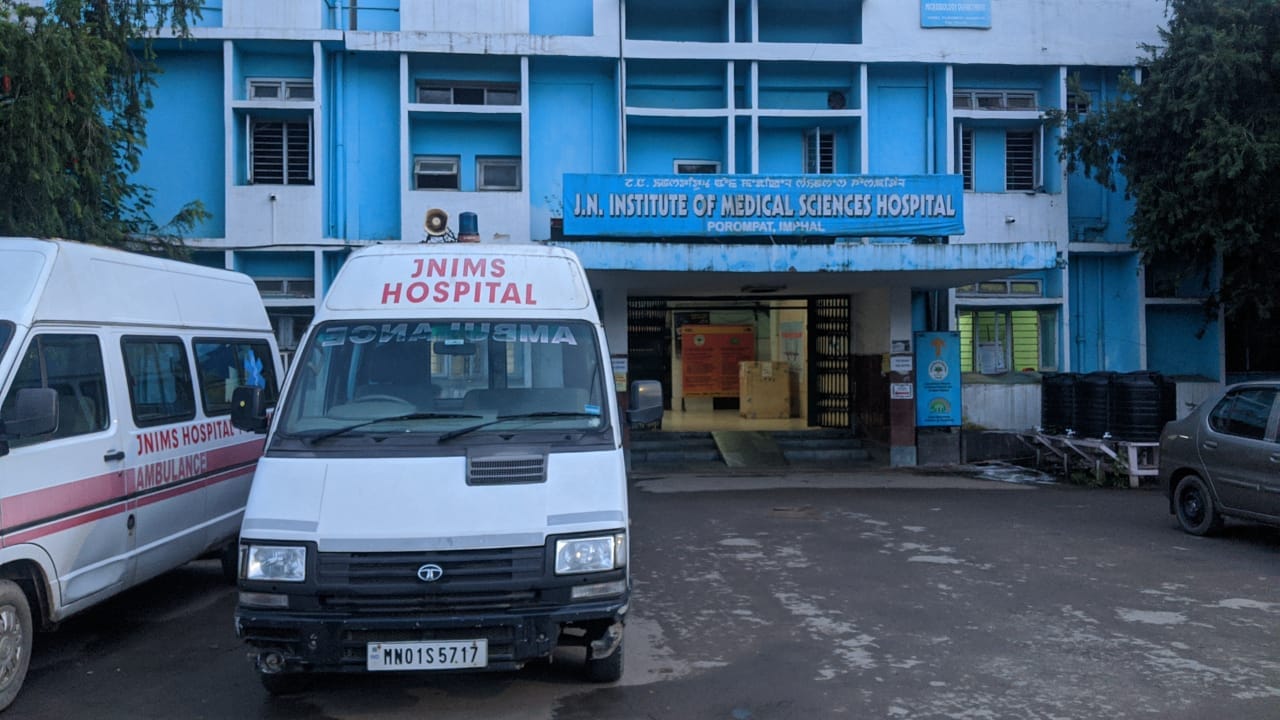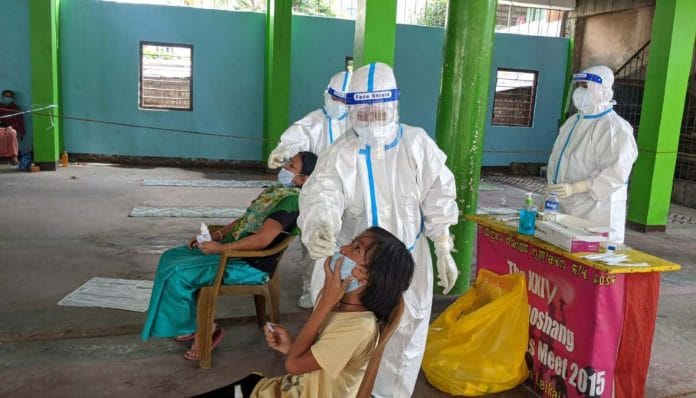Imphal: Eighty per cent of Manipur’s Covid-19 cases are asymptomatic, a state health department official told ThePrint with a sigh of relief. A larger patient load, the official suggested, would have wreaked havoc on the healthcare infrastructure in Manipur, where he says, only two government hospitals in capital Imphal can handle severe Covid-19 cases.
“Severe cases are only at RIMS and JNIMS (Regional Institute of Medical Sciences, and Jawaharlal Nehru Institute of Medical Sciences),” the official said. “The district hospitals can’t handle such cases because we don’t have the specialist doctors. We have ventilators only in a few districts including Churachandpur, and Thoubal… Also, only Churachandpur is well equipped with manpower, the others are lacking and only one or two can manage an ICU patient.”
There is no official data to corroborate the claim that 80 per cent of Manipur’s coronavirus patients are asymptomatic, but it sits in line with health ministry estimates for Covid-19 cases across the country.
Manipur has so far recorded 5,585 Covid-19 cases, of which 27 have resulted in death. As of Saturday, it had 1,759 active case. The state’s case fatality ratio (CFR) — the percentage of Covid patients who die — is much lower than the national average, 0.46 per cent against 1.81 per cent (as of Saturday).
Even so, those manning the state’s Covid-19 response on the ground talk of the many challenges they face in their quest to address the biggest health challenge the world has experienced in decades.
Authorities at a Covid care centre in Ukhrul, which borders Nagaland, say they don’t have running electricity. Doctors complain of a crushing workload made worse by a shortage of specialists even the government acknowledges, and staff on non-Covid duty complain they have been deprived of the protection they need amid a pandemic.
JNIMS and RIMS together have 224 Covid beds — 140 beds at the former and 84 at the latter.
Dr Uthan Tharoijam of JNIMS, who was seen fainting while tending to Covid-19 patients in a distressing viral video earlier this month, and subsequently diagnosed with the disease, said the pandemic has served as an eye-opener for the state’s long-ignored healthcare infrastructure.
Principal Secretary (Health and Family Welfare) V. Vumlunmang said the state is faced with a severe resource crunch as it fights the pandemic.
“We are working against the deficiencies. But we have adopted 100% Covid testing right from the beginning, instead of relying on thermal screening like in other states. That has been beneficial because our positivity rate is far below the national average,” he said.
Vumlunmang added, “I would also admit that neither the funding, nor the manpower, nor the equipment is abundantly available. That constraint has been there but within that my own assessment has been that we have managed the crisis without leaving people unattended.”
Also Read: How communities in Nagaland, other NE states are fighting Covid with own task forces, SOPs
Sifting through patients
Manipur recorded its first case on 24 March, when a 23-year-old returned from the UK. By the end of June, thenumber of cases had jumped to 1277, as special trains that started in May brought back people from other states.
The Manipur government subsequently devised a meticulous policy of testing and quarantining all returnees. A Covid Care Centre was set up in each of the state’s 16 districts, with a capacity of 48 to 350 beds, to quarantine asymptomatic patients.
To identify patients as asymptomatic and symptomatic, the state government constituted an admissions committee headed by the additional director of health services.
“(The committee will assess) Covid positive patients who need admission in the hospitals. The chief medical officers of all the districts will have to refer the patient to the committee along with all their details — whether he or she is symptomatic or asymptomatic,” said Dr Tokpam Rajen Singh, the JNIMS medical superintendent and member of the Covid admissions committee.
However, a Covid-19 patient from Thoubal district told ThePrint that the well-oiled system didn’t prove to be much help to him.
The patient said he started developing Covid-19 symptoms on 15 August. A test at a local private facility yielded a negative result. However, when his symptoms persisted, he decided to visit Imphal, which is roughly a 40-minute drive away.
The experience was no better, said the patient. He was tested at JNIMS around 8.30 pm and his results came back midnight. It would be another nine hours — he spent the time in the waiting area of the hospital — before he was admitted, he said.

The JNIMS medical superintendent admitted that the patient had been made to wait, but said he hadn’t followed the procedure.
“For admission in the hospital, they (patient) can’t come directly. They should come here through the consultation of the chief medical officer (CMO). First they have to inform any doctors of the quarantine centre. They (doctors) will inform the CMO, then the CMO will tell the medical director and the directorate will send the patient here (JNIMS) or the RIMS, or any other Covid Care Centre,” he said. “And according to the severity of the case, the patient will be admitted in the JNIMS or RIMS.”
Other concerns have emerged too.
At the Covid Care Centre set up at TK Woods Resorts in Ukhrul, the authorities complained they do not have running electricity.
Located 21 km from the main town, the facility has so far housed 172 asymptomatic patients. Dr Yuithingla Vashum, the centre’s in-charge, however, described the infrastructure as “not an ideal one”.

“We are running the Covid Care Centre mainly by generator… The infrastructure is not ideal. It’s dormitory style without room compartments for those with comorbid conditions. So we made temporary partitions,” Vashum said.
As of 20 August, the district had recorded 378 cases, which is among the highest in the state. However, according to the health department’s data from 21 August, the district hospital at Ukhrul can accommodate just 16 patients.
“There are no facilities in any of these district hospitals, like ICU, no infrastructure capable of handling the severe cases,” said a JNIMS doctor, who didn’t wish to be named.
The eight district and sub-district hospitals of the state are equipped with just 345 beds, of which 135 have been designated for Covid care. “We are very lucky that corona out here is more mild than other places. So far, there is not a single patient who has gone under ventilation,” the doctor added.
Also Read: There’s a Covid surge in Northeast as infection & positivity rates shoot past India average
‘Overworked & understaffed’
For the doctors and nurses in Manipur, the pandemic has been a long-drawn and uncertain battle — one they are fighting with limited manpower.
“For Grade IV (medical officer), the capacity is 1,400-1,600 but only 400-500 have been recruited — there is a vacancy of 1,000… We have been working for the last three-four months, and people have become fatigued,” the source in the health department said.
The website of the state’s health directorate also highlights the “acute shortage of specialists” in the state. “It’s only those in the quarantine centre that are doing the duty for seven days and quarantining for seven days. The testing team has been working non-stop,” the source added.
“We don’t get rest. We work seven days a week. For work assignments, we get the message as early as 8.30 in the morning daily. It’ll be good even if we get three days break in a month,” said an AYUSH pharmacist, who is a part of the testing team of Imphal West and didn’t wish to be named.
Earlier this month, the viral video of Dr Uthan Tharoijam fainting while tending to Covid patients brought attention to the exhausting shifts doctors are working.
“There’s definitely a shortage of manpower, especially of expert in medical fields. Moreover, the situation has been made worse by the fact that we can’t freely check the patients anymore. We have to wear PPE kits now. So we have to wear all these protective gear for at least two hours. This is something unimaginable,” he told ThePrint over the phone.
‘Lack of PPE’
Sanjarani Devi — a nurse at JNIMS and the vice-president of the Trained Nurses’ Association, Manipur — pointed to another issue that healthcare staff have been facing, “There’s a lack of PPE in the general ward. We do get it, but it’s not sufficient because the number of staff is higher,” she added.
On 6 August, the Manipur government issued an order stating that all the private and government hospitals have to mandatorily provide services to all patients who approach them. The order came after a pregnant woman died for want of treatment after she was denied treatment by five hospitals. Patients who are being treated for non-Covid ailments are required to undergo a rapid antigen test, a quick Covid-19 exam, at the hospital, but Sanjarani said this test alone is not enough to confirm if the person they are tending to has Covid-19.
“Nobody can really figure out if someone is Covid positive or negative. They just normally come with complaints of fever, cough, diarrhoea, pregnancy and all these cases. We do test them with rapid antigen test (RAT), but still it’s RAT, we can’t really guarantee. So that’s why we need protection gear,” Sanjarani added.
Also Read: Mizoram, Manipur are using this traditional practice to keep coronavirus in check
‘Covid a lesson’
The JNIMS doctor quoted above said even before the pandemic it wasn’t unusual for the hospital to run out of basic medical items like betadine — an antiseptic liquid.
“There is a lack of basic things here… In other areas of the country, these medical equipment are in surplus. Whereas in Manipur, when I started working, the patient had to purchase everything including gloves, betadine, spirit — the small things as well,” he said.
Dr Uthan described the pandemic as an eye-opening lesson about health infrastructure in Manipur. “In the preceding many years, we have been neglecting the medical areas and we will not be able to fill the loopholes in such a short time,” he said. “This (Covid) is a lesson. It’s an eye-opener for all of us. Whatever facilities we are given. We should try to intensify everything.”
Also Read: 6,42,588 tests in 24 hrs push positivity down to 8.5%. Manipur records first 4 Covid deaths






